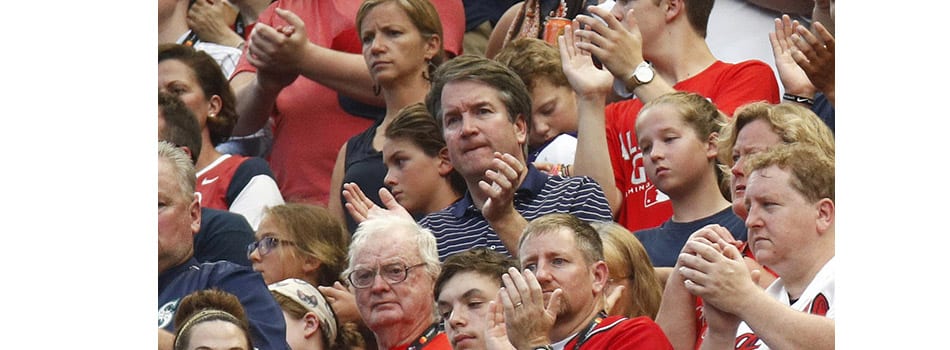Embattled Supreme Court nominee Brett Kavanaugh, who has been grilled by Democratic members of the Senate Judicial Committee hoping to forestall his lifetime appointment to the highest court in the land, says the hundreds of thousands of dollars in debt he incurred related to the purchase of Washington Nationals tickets was entirely above-board. An avid sports nut, Kavanaugh says that he purchased tickets on behalf of a group of friends, but those costs were repaid in total.
“Everyone in the group paid me for their tickets based on the cost of the tickets, to the dollar,” Kavanaugh told senators in answers submitted for the record to questions they had asked. “No one overpaid or underpaid me for tickets. No loans were given in either direction.”
Eyebrows were raised by financial disclosures Kavanaugh made in recent years that were given a closer look once he was nominated by President Trump. In 2016, he reported having between $60 and $200,000 in debt spread over three credit cards and a loan. Those debts were reportedly related to the purchase of Nationals tickets (Kavanaugh served on the bench in Washington D.C., where he grew up and attended Georgetown Preparatory School in leafy Bethesda, MD) as well as home improvements.
One thread on Reddit.com went into deep detail theorizing that Kavanaugh may have been supplementing his income by flipping tickets on the secondary market, given that these debts were incurred during some peak seasons for the D.C. baseball team. More substantial questions were raised regarding the murky nature of how one might hide other less savory transactions under the blanket of a ticketing pool among friends.
According to NBC-2.com, Kavanaugh said the baseball tickets were part of a group purchase divided among friends, all avid Nationals fans. He says he attended “a couple hundred games” between 2005 and 2017, including playoff purchases.
“I have attended all 11 Nationals home playoff games in their history,” he said. “(We are 3-8 in those games.)”
As motherjones.com notes, Kavanaugh is not the first Supreme Court nominee to be grilled over his finances, but many of his predecessors were appointed to the court having made substantially larger salaries in their careers as litigators. Kavanaugh has served his entire career in government service, earning a salary of around $220,000 in recent years on the Federal bench. In contrast, Chief Justice John Robers had been earning over $1 million a year salary in private practice before he was appointed to the D.C. Circuit as a judge.
“His financial disclosure forms have raised more questions than they’ve answered,” Stephanie Mencimer writes, “leading to speculation about whether he’s had a private benefactor and what sorts of conflicts that relationship might entail.”
The battle over the second appointment to the Supreme Court for President Donald Trump goes way beyond ticketing, but it is interesting to see how it continues to come up in the discussion as the two sides push back and forth in hyper-partisan fashion.




